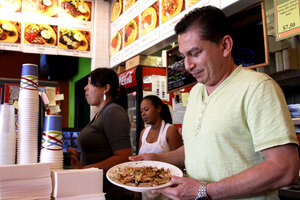Local restaurateur partners with students to help Salvadorans in need
The first time Tito Rivera made the trek from El Salvador to Los Angeles, he was forced to move under the cover of night while using any means possible to cross the border.
The 43-year-old owner of Viztango Café was born in San Miguel, El Salvador, but fled in 1981 when a civil war overtook the country.

Good service · Tito Rivera, who fled a civil war in El Salvador to come to America, serves customers at his restaurant, Viztango Café. - Mike Lee | Daily Trojan
Rivera and his niece traveled for days before they made it across the border into the United States, eventually settling in Los Angeles.
“When you have no visa, you have to come however — by bus, by car, however,” said Rivera, who is now a US citizen.
Today, he travels in style.
Rivera, who has since become a successful restaurateur, now enjoys a more dependable method of transportation — his Cardinal and Gold-adorned Chevrolet Silverado.
He has also become active in the USC community, partnering with student organizations to give back to Salvadorans in need.
“You can see the necessity of the people,” he said. “They have nothing. They’re shoeless. They don’t have beds.”
But there was a time when Rivera was working hard just to fulfill his own needs and those of his family.
Fresh from El Salvador, the 15-year-old Rivera, charged with supporting his niece, found a job washing dishes at Dolores Restaurant & Bakery in West Los Angeles to pay his bills.
He worked his way up, landing a job at Campanile Restaurant and later spent 14 years as a cook under Wolfgang Puck at Spago in Malibu.
For much of that time, his country’s civil war prevented Rivera from returning home to El Salvador. It was not until 1992, 11 years after his departure, that Rivera returned to his family.
“I have my grandma; she’s 102 years old. She lives in the small town where we were born,” he said. “They were shot [at] with airplanes and everything, but she didn’t want to come along.”
Content with his life in Los Angeles, Rivera decided to stay in the United States, but began making annual trips home to visit family and to support his former community.
Soon, Rivera’s younger sister joined him in Los Angeles. He helped her enroll at USC and moved his family — a wife and two children — to the Jefferson Park neighborhood west of the University Park Campus.
It was there that he noticed a niche that his work experience could help him fill.
“I noticed there was nothing around, and we came up with the idea to bring in a restaurant,” he said.
With the money he had saved from working at Spago and the help of friends, Rivera drew up plans for the new restaurant.
“I wanted to have the food like in Malibu, where I had been working, but bring it to a price that students could pay for,” he said.
In 2003 Bistango Café, since renamed Viztango Café, opened its doors in the retail center on the corner of Figueroa and 30th streets.
Business was slow during the restaurant’s first three months, but it picked up once students returned to campus, and soon Rivera was forced to double his staff from eight to 16 to keep up with the rush.
“It was overnight,” he said. “Since then, we’ve gotten busier and busier. Now we are more and more stable, so we’re thinking about how to help people.”
The success of the restaurant encouraged Rivera to finally help his native country the way he had always wanted.
“People ask me, ‘You help because you have money,’” he said. “But I said, ‘No, because I have money makes me able to do it.’”
Rivera also became active in the USC community, donating more than $3,000 worth of food to the Swim With Mike fundraiser each year and often working with student groups on campus.
Rivera’s next venture is a fundraiser co-sponsored by Viztango and Sigma Alpha Epsilon fraternity, which will include food and live Latino music. All funds from the November event will go toward supporting impoverished Salvadorans.
“He came by the house and we just started talking and things went from there,” said Patrick Ahern, a junior majoring in health promotion and disease prevention and the co-philanthropy chair for SAE.
Rivera has also partnered with the Central American Television Network and its anchor Antonio Ayala to raise money and toys to distribute throughout El Salvador in the winter.
Ayala, host of the program Hola El Salvador, has been building support for the Salvadoran community in Los Angeles, the second largest Latino community in California, for the last 13 years, and said he was enthusiastic when Rivera asked to come on board for the show’s annual Toy Telethon in November.
Ayala and Rivera expect to collect more than 50,000 toys at the fundraiser to distribute at churches, hospitals and other community centers in small Salvadoran villages over the winter holidays.
“I was born in a very small village and I remember, when I was a little kid, getting happy when someone gave me a toy,” Ayala, who is also a native of El Salvador, said.
Nearly 30 years removed from his initial covert journey out of El Salvador, Rivera remains rooted in his past, but embraces the life he’s made for himself at the heart of the USC student body. He owns football season tickets and can be seen driving his Trojan-colored Silverado to all events catered by Viztango.
“We feel like we are family. USC’s our family,” he said.
But despite his success, he will always feel an obligation to the people he left behind.
“When you want to help, you just feel it,” he said. “You don’t have to have money to do it.”
